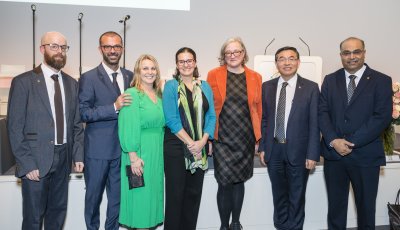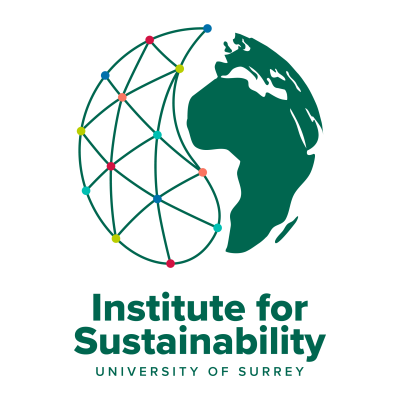Surrey Institute for Sustainability Launch
Co-Director of Surrey's new Institute for Sustainability, Dr Tom Roberts, reflects on the Institute's launch event and the many opportunities created by the initiative.

On the 1st December, the University of Surrey launched its new Institute for Sustainability at the Royal Society in London. The Institute aims to increase the scale and enhance the excellence of the University’s research and innovation on all aspects of sustainability.
The launch was a fantastic event, which included welcomes from both Professor Lorenzo Fioramonti, the new Director of the Institute, and Professor Max Lu, former President and Vice Chancellor of the University of Surrey. This was followed by a panel session during which three high profile speakers, Jo Swinson, Nick Stern and Sandrine Dixson-Declève, gave some fascinating insights into the current state of our progress (or lack of) towards meeting a range of climate change goals. Inevitably, there were quite a few references to the immense challenges we face and some dismay at the lack of progress made over the last two decades. There was also plenty of positivity, however. In particular, it was noted that low carbon technologies were accelerating far faster than previously expected, environmental issues are now (at least in theory) central to decision-making across governments and industry. The message was clear, we now have the tools we need to de-carbonise society, the challenge is to pull together our collective knowledge and build the social, political, and economic momentum needed to facilitate change.

The event was also an opportunity for members of the Department of Sociology to showcase some of the sustainability research being undertaken. Drawing on contacts made though her work on the Sustainable Cut Flowers Project, Dr Jill Timms provided a fantastic display of fair trade flowers, which highlighted the challenges of supplying sustainable cut flowers, but also that alternative approaches are possible. Prof Kate Burningham and Dr Anastasia Loukianov produced a photographic display highlighting their work on the CYCLES project which explores the lifestyles and aspirations of young people living in cities.
In my new role as Co-Director of the Institute for Sustainability, I’m keen to work with colleagues across the Faculty of Arts and Social Sciences (FASS) to increase the amount of sustainability focused research undertaken and ensure that humanities and social science researchers are at the centre of the Institute’s activities. Historically, the humanities and social sciences have played second fiddle in sustainability research, often brought in as a late addition to give the impression of interdisciplinary collaborations and restricted to exploring public perceptions or the impact of a new technology. However, given that we have now reached a stage in the transition to a low-carbon society where the biggest challenges are social, political and economic rather than technological, we need to see more sustainability research designed and led by the social sciences and humanities. For example, there is an urgent need to explore what a post-carbon society might look like, how to ensure the transition is fair and equitable and how it can be brought about with the consent and support of society.

As well as bringing together researchers across the University who are already working on sustainability related research, the Institute is keen to engage the wider university community and explore opportunities to embed sustainability into all the University’s activities. Currently, many departments are exploring ways to embed the UNs Sustainable Development Goals into all our teaching. This has the potential to increase the relevance of course content and prepare Surrey’s students for a future workplace where sustainability will be central to the vast majority of careers. Furthermore, much of the research undertaken across the University could be further enhanced by adding a sustainability angle, potentially increasing the impact and unlocking additional sources of funding. Finally, as a large organisation occupying a significant amount of space within the Guildford community, through our operations we have an amazing opportunity to showcase new sustainable technologies and how they could enhance our everyday lives.
In short, the Institute for Sustainability presents an exciting new opportunity for the whole university community to have a positive impact on the transition to a sustainable society.

